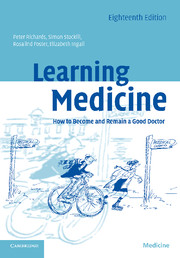Book contents
- Frontmatter
- Contents
- Foreword
- Preface
- 1 Why medicine and why not?
- 2 Opportunity and reality
- 3 Requirements for entry
- 4 Choosing a medical school
- 5 Application and selection
- 6 Interviews
- 7 Medical school: the early years
- 8 Medical school: the later years
- 9 Doubts
- 10 The new doctor
- 11 Developing your career
- 12 Career opportunities
- 13 Privileges and responsibilities: avoiding the pitfalls
- Postscript
- Appendices
- Index
10 - The new doctor
Published online by Cambridge University Press: 02 December 2009
- Frontmatter
- Contents
- Foreword
- Preface
- 1 Why medicine and why not?
- 2 Opportunity and reality
- 3 Requirements for entry
- 4 Choosing a medical school
- 5 Application and selection
- 6 Interviews
- 7 Medical school: the early years
- 8 Medical school: the later years
- 9 Doubts
- 10 The new doctor
- 11 Developing your career
- 12 Career opportunities
- 13 Privileges and responsibilities: avoiding the pitfalls
- Postscript
- Appendices
- Index
Summary
Almost all medical students would agree that the final examinations for their medical degree, whatever form they take, are the most terrifying and daunting experience of their lives. That is until a few weeks later when they walk onto the wards for the first time as a “proper doctor”. After 4 to 6 years preparing for this day, you are thrust headlong into the real world. To become a really proper doctor, that is to be a fully registered medical practitioner, the General Medical Council (GMC) requires each new doctor to complete a year of satisfactory service in an appropriately supervised, educationally supported pre-registration house officer post. This is the first year of the 2-year Foundation Programme which begins the postgraduate training phase of the doctor's career. Major reforms of medical training and the application processes have been in put in place in recent years and, as in so many aspects of healthcare, continued reform is promised. The intention is to give a broader base of experience in a variety of specialities. It is thus argued that a more informed choice can be made as to which speciality one may choose after the Foundation Programme and that is produces a more ‘well-rounded’ doctor. While the aims of many of these reforms are laudable in terms of ending the influence of the “old-boy network” on job applications and making the systems more streamlined, transparent and fairer, in reality the wholesale introduction of an electronic centralised system has had significant teething troubles which have made a stressful time in a doctor's life even more uncertain.
Information
- Type
- Chapter
- Information
- Learning MedicineHow to Become and Remain a Good Doctor, pp. 130 - 142Publisher: Cambridge University PressPrint publication year: 2007
